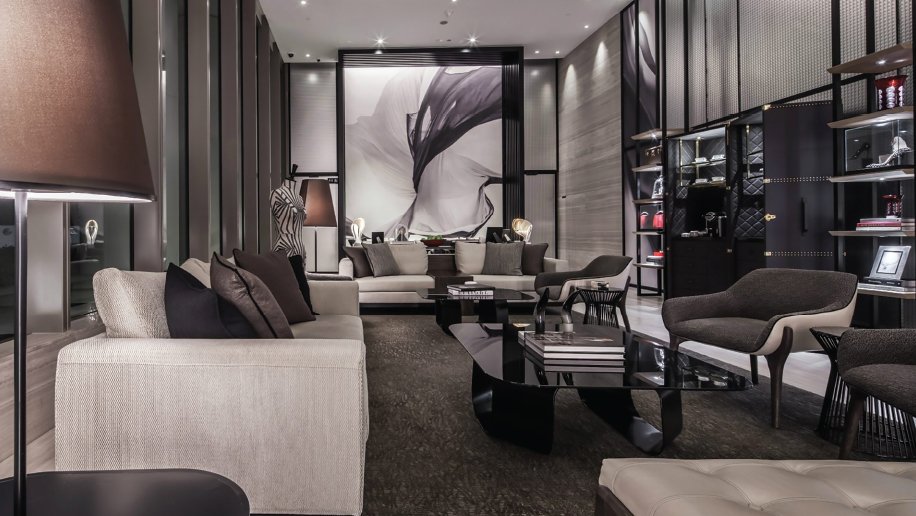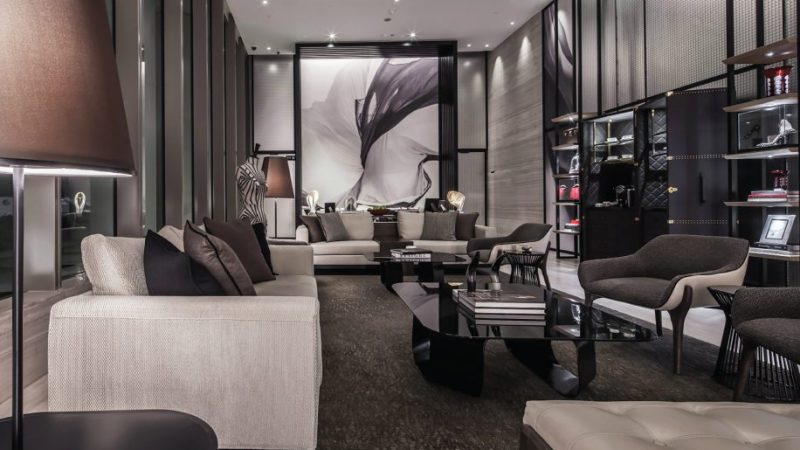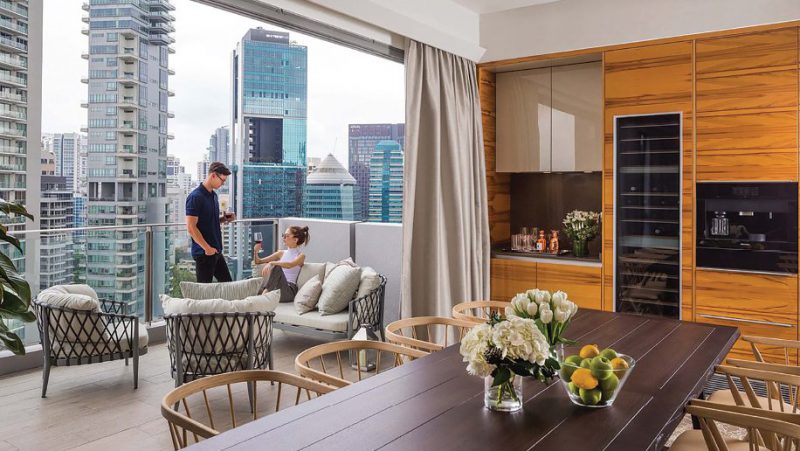Luxury Staying Power
Extended stay operators are stepping up their game to satisfy the demands of more discerning guests
October 26, 2019


“The evolution of overnight.” That’s what Matthew Hostetler, senior vice president of Red Roof, calls the changes on every front in the corporate lodging/extended stay market. In an attempt to keep up with those changes, the recent Serviced Apartment Summit in New York saw representatives of traditional corporate housing providers like Oakwood and Furnished Quarters, OTAs like Booking.com, startups like WhyHotels – which creates pop-up hotels in new luxury buildings – and homesharing companies like Airbnb working side by side to figure out where the industry goes next.
Some business travelers and expats may regard serviced apartments simply as temporary places to stay for, at most, a few months before finding a permanent place to live in a new city or country. They do not expect, nor require, the same luxuries one might find in high-end hotels.
With the globalization of lodging and the ubiquitous presence of mega-players like Marriott, Hilton and Accor, there is still very much a bifurcated landscape when it comes to extended stay – with the tradition of serviced apartments continuing to dominate outside the US, while extended stay as it was invented and evolved here prevailing in this market.
Whatever it’s called, the extended stay/corporate lodging segment continues to grow as evidenced by the proliferation of new brands and the entry into the market of venerable brands like Red Roof with its HomeTowne Studios. In the US, this includes such startups as Stay Alfred, a pioneer in the short term rental space, with extendable stay units in 33 downtown cities including Miami, Chicago, Denver, Nashville, Washington, D.C. The company was founded in 2011 by a former Amy Ranger and has since accommodated more than 800,000 guests, and services some 700 corporate accounts.
Other such entrants into this market include Philadelphia-based AKA Hotel Residences, which offers a menu of luxury apartments in key cities and often caters to celebrities and CEOs in search of some local flavor, a little home-style comfort and lots of privacy in week- to month-long stays.
For the first time in seven years, the number of rooms under construction in the extended-stay sector fell compared the previous year. However that drop may take some time to work through the market, according to Mark Skinner, partner at The Highland Group. “Despite the decline in supply growth, the timing of the 47,000 extended-stay rooms under construction will still be a major factor in the segment’s performance in 2019.”
 Looking Abroad
Looking Abroad
There is further crossover as players learn from one another – so typical American extended stays are moving onto other continents while European products like hostels and co-living take hold here.
The international expansion of extended stay, says Rick Colling, global head-Homewood Suites by Hilton, is making more travelers familiar with this option in their own backyards. His brand debuted a Latin American prototype to meet growing demand for the product in the region. And recently, InterContinental Hotels Group signed a contract to convert two properties in Dubai into Staybridge Suites, extending the brand’s reach in the Middle East.
With that growth, serviced apartment owners and operators are recognizing a new trend among their guests at the higher end of the market. Many are seeking out accommodation that offers a more luxurious experience.
“We can look at many different accommodation projects, and a lot of them are what we call ‘cookie-cutter’,” says Paul Cunningham, general manager of K11 Artus, a 14-story, 287-unit serviced residence on Hong Kong’s Victoria Dockside. “People are looking for something more unique.”
K11 Artus, which is set to open in the third quarter of 2019, is being billed as the “first ultra-private luxury residential development.” What this translates to is that guests will have the chance to enjoy suites with wraparound balconies affording views of Victoria Harbor and Hong Kong’s iconic skyline.
Besides offering the comprehensive hotel services that can be found in most serviced apartments, K11 Artus aims to “redefine the luxury residence experience,” by introducing a new “Artisanal Home” concept. Among the features are traditional Chinese artisanal works displayed throughout the property, and in-house cultural salons hosted by prominent cultural figures throughout the year.
“We are trying to attract the type of clients who want to live in an inspiring environment,” says Cunningham.
Guests at K11 Artus will also have access to a 24-hour digital concierge platform called Amici. Added as a contact on instant messaging apps WhatsApp, Line or WeChat, Amici lets guests communicate with staff members for any service requests on their own devices, without having to download any additional app.
Jumeirah Living Guangzhou, the first serviced residence project of Dubai-based Jumeirah Hotels and Resorts in the Asia-Pacific region, also rolled out a similar service called “E-Butler” in June. This allows guests to contact their service team using WeChat. (WhatsApp and Line are typically blocked by China’s Internet censorship and WeChat is the country’s most popular instant messaging app.)
This luxury serviced residence opened in February this year in Guangzhou’s Zhujiang New Town business district. Split between two towers, the property has 169 all-suite apartments fully equipped with home appliances.
Finding Balance
Across the Asia Pacific region, the story is much the same. Serviced apartment brand leader Oakwood has also recognized this trend and has begun to work with different companies to implement smart technologies in select properties.
For example, at Oakwood Premier OUE Singapore guests can use in-room tablets with a built-in app to check out useful information about the property, the neighborhood and the city. The app also allows guests to submit service requests and feedback, read instructions for in-room amenities, and even order takeout food and shop for groceries online.
Singapore-based Frasers Hospitality Group also has properties outfitted with a range of facilities in its serviced residences portfolio. Some of them even have facilities rarely found in other hotels or serviced apartments,
The newly opened 115-unit Fraser Residence Orchard in Singapore, which opened in April, has an in-house aqua gym, a sky garden for residents to unwind, as well as a barbecue and teppanyaki pavilion.
At Fraser Suites Shenzhen in southern China, guests have access to a snooker room, media room, meditation room, exercise studio with yoga and Pilates classes, Kids Playzone, rooftop infinity pool, sky bar – and even a golf simulator room.
“By introducing these facilities, we hope that business travelers and family guests can reach a balance between work and life during their stay at their residences, which, in turn, is also good for improving their work efficiency,” says Chew Hang Song, deputy country general manager of Frasers Hospitality in China.
Home Away From Home
In addition to the US and Asia Pacific, the United Kingdom is also seeing both young and established brands responding to demand with new openings and revamps across the country.
Among the many recent debuts in London, Marriott opened the first of its extended-stay brand in the capital, the Residence Inn London Bridge, in 2017 in Southwark, offering 87 suites in walking distance of the Shard. Rooms are a mixture of studio, one-, twin and two-bedroom set-ups equipped with kitchens.
That was followed by the 307-room Residence Inn London Kensington on Warwick Road in Earls Court, a ten-minute walk from the Olympia exhibition center. Like the London Bridge property, it will offer a grocery delivery service, a gym, a 24-hour shop, free breakfast and free WIFI.
Marlin is the largest owner-operator of serviced apartments in London, with more than 900 units in seven locations including London Bridge, St Paul’s, Canary Wharf and now Waterloo. A ten-minute walk from Waterloo station, Marlin Waterloo is the group’s first “aparthotel,” comprising 236 rooms and featuring free Wi-Fi___33, a 24-hour concierge, a good-sized bar, a gym, nine meeting rooms and a laundry.
Meanwhile further north, Saco’s design-led aparthotel brand, Locke, occupies a six-story townhouse on George Street. It has 72 studios ranging in size from 300 to 350 square feet, all with kitchens and living areas designed by New York architects Grzywinski+Pons. Weekly yoga, meditation, cooking and running classes are available, alongside one-to-one training, while in-room spa treatments include massages, facials, haircuts and make-up.
On the Royal Mile, AccorHotels has opened its third Adagio property in the UK, and its first worldwide to feature the brand’s new-look design. The 146-unit property is located in the city’s New Waverley development, and features a mix of studio and one-bedroom apartments. Amenities include a laundry room and dry cleaning service, a 24-hour fitness center and reception, daily breakfast and weekly cleaning.
In markets around the world, extended stay accommodations are changing to meet the demands of the traveler desiring a “home-away-from-home.” As a result, properties tend to offer more amenities and luxuries than in the past. There are more fitness centers, and more locations with greater access to shopping, dining and entertainment options.
Travelers want options – to eat in their “home” or at one of a variety of restaurants, to stay in and watch television or stream a show or attend an entertainment event at a nearby location. It is clear, then, that serviced residence operators see opportunities for attracting those guests seeking – and willing to pay for – a luxurious stay.




